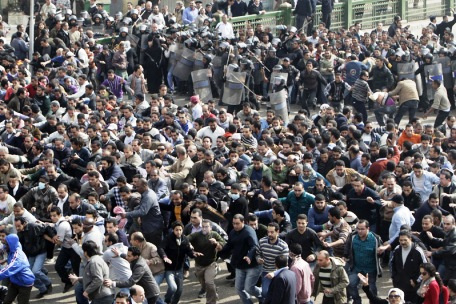Will Egypt Turn into Another Libya

By: Saad Idris
The bloody turnover of Al-Tahrir Square was an end to the brutal suppression in the wake of the million-strong rallies against Husni Mubarak. Those rallies were in vain, thought many of the people, as one dictator had been replaced by another. The recent gatherings in Al-Tahrir were evidence that there has been no change in the violent behavior of the State. Citizens still persist in their demands: the military should relinquish power and draft a timetable for the presidential election. In the meantime, the Egyptians are calling for alterations in the constitution in a fashion which precludes the rise of another dictator, calls not met by the Supreme Council of Armed Forces (SCAF) to date. Stern in their demands, Egypt’s citizens have severely opposed the extension of rule of the council until April. They also do not stand for the modifications proposed by Deputy PM Ali Salmi, approved by SCAF Deputy Head Lieutenant General Sami Anan. They have strongly rejected any prescriptions by the Egyptian military regarding Egypt’s political future or any privileges they demand beyond the observation of the national parliament or the council.
Nevertheless, it is not only the delay in calling off the interim rule of the council but also the parliamentary election that matters: it is not clear how it will be held. Looking at Egyptian society, we see the culturati and the political elite who are trying to soothe the anger of the masses. It is not unlikely that the unrivalled Islamists will win the majority of the parliamentary seats. Nonetheless, the most detrimental outcome would be the confrontation of the people and the army, something that has never happened even in the time of Mubarak. Such an incident may trigger a saga like the Libyan blood-soaked scenario, or Syria’s turbulent situation. Some American analysts try to portray Egypt as a country prone to civil war where all capacities should be used to put off a battle. For example, Foreign Policy magazine writes that the presence of millions of Egyptian people last Friday transmitted an important message to the military council that they should not postpone transferring power to civilian rule, they should shut down trials in military courts and annul the state of emergency. It continues that the existing political responses show that Islamists will be the winners of the elections, an occurrence that widens the gap among political parties. The New York Times regards the million-strong presence as the biggest warning to the transitional council since the overthrow of Mubarak’s regime. The Wall Street Journal also called the rally as an end to the alliance between the Islamists and the SCAF.
If the trials of former government’s officials, the law bidding dismissal of the former regime’s political officials and the economic and social crises are added to the blackout the government has imposed, it becomes clear that the upcoming election could be different from what we expected and will fail to fulfill the promises made. Prolongation of this situation is quite dangerous, as it widens the gap between the supporters of the army and the pro-civil rule supporters who rule out any military intervention in politics, plunging the country into a civil war. However, both sides are afraid of Egypt turning into another Libya and are aware of the boundaries.
Regrettably, the Americans and Israelis are trying to indoctrinate the danger of the military or Islamists’ rise to power. CFR member Steven Cook was quoted in the Washington Times as saying that the military council has failed to meet the demands of the al-Tahrir protestors. Military affairs analyst Alex Fischman writes in Yediot Ahronot that the Egyptian top brass are aware that the greatest threat to Egypt is neither economic collapse nor security issues in the Sinai region, but radical Islamism. Fischman compares Egypt to a wounded dinosaur trapped in a net and unable to rescue itself. He adds that the central government in Egypt is on the verge of collapse and the once-spiritual leader of the Sunni world is on the decline.
These are not random remarks, but efforts trying to portray Egypt as a country teetering on the brink of explosion and civil war. There may be a scenario written for Egypt to be performed in case power transition from the SCAF to the civil politicians, and timely elections, do not take place.
* Saad Idris is head of the [Persian] Gulf and Iran Studies unit at Al-Ahram Center for Political and Strategic Studies and a columnist for the Egyptian al-Ahram Daily.

